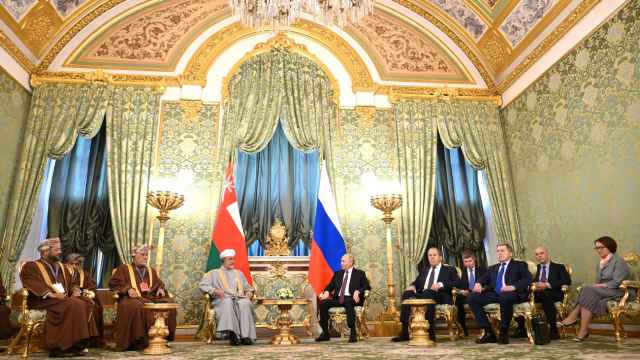Russia said on Thursday that Europe should model its planned operations to tackle migrant smuggling across the Mediterranean from Libya on anti-piracy patrols in waters off Somalia, but that it would be too extreme to destroy the boats used.
European Union leaders agreed last month to "identify, capture and destroy vessels before they are used by traffickers," but it is unclear how that may be achieved and the 28-nation bloc wants U.N. authorization for its operation.
European members of the U.N. Security Council — Britain, France, Lithuania and Spain — are drafting a resolution to authorize intervention on the high seas, in Libyan territorial waters and onshore in Libya to seize vessels.
Russia's U.N. Ambassador Vitaly Churkin said of the bid to destroy the vessels: "We think it's just going too far."
"We think that we should stay within the scope of what we have, roughly what we have for the piracy situation off the coast of Somalia. We have a good precedent, so why not use it," he told reporters.
The U.N. Security Council resolution authorizing the anti-piracy operations calls for the seizure and disposal of "boats, vessels, arms, and other related equipment used in piracy and armed robbery at sea off the coast of Somalia."
The EU has said it plans to use its anti-piracy "Atalanta" operation off Somalia as a model for Mediterranean migrant operations. That mission specifically targeted a Somali pirate base onshore in May 2012, destroying several boats.
Churkin said destroying boats used for migrant smuggling could create practical and legal problems.
"For instance, if you lease a boat to somebody and then that somebody is using it to transport migrants illegally and then the boat is destroyed, what about the owner of the boat?" he said.
Churkin noted that formal council talks had not started yet.
"It's not like we're in a kind of prohibitive mode, we're simply trying to be helpful," he said.
About 1,800 migrants have perished in the Mediterranean this year, the U.N. refugee agency said. Some 51,000 have entered Europe by sea, with 30,500 coming via Italy, fleeing war and poverty in Asia, Africa and the Middle East.
Libya has descended into chaos nearly four years after the fall of Muammar Gaddafi. Two competing governments backed by militia brigades are scrambling for control of the oil-producing country, creating havens for Islamist militants and traffickers
A Message from The Moscow Times:
Dear readers,
We are facing unprecedented challenges. Russia's Prosecutor General's Office has designated The Moscow Times as an "undesirable" organization, criminalizing our work and putting our staff at risk of prosecution. This follows our earlier unjust labeling as a "foreign agent."
These actions are direct attempts to silence independent journalism in Russia. The authorities claim our work "discredits the decisions of the Russian leadership." We see things differently: we strive to provide accurate, unbiased reporting on Russia.
We, the journalists of The Moscow Times, refuse to be silenced. But to continue our work, we need your help.
Your support, no matter how small, makes a world of difference. If you can, please support us monthly starting from just $2. It's quick to set up, and every contribution makes a significant impact.
By supporting The Moscow Times, you're defending open, independent journalism in the face of repression. Thank you for standing with us.
Remind me later.





